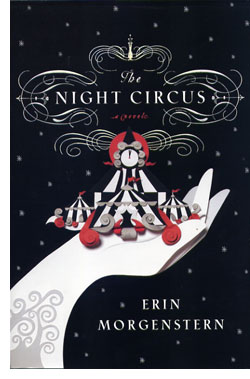 |
 |
 Erin Morgenstern
Erin Morgenstern
The Night Circus
Reviewed by: Rick Kleffel © 2011
Doubleday / Random House
US Hardcover First Edition
ISBN 978-0-385-53463-5
Publication Date: 09-13-2011
394 Pages; $26.95
Date Reviewed: 09-29-2011
Index:
Fantasy
General Fiction
Magic is in the mind of the beholder, and it takes many forms. From a simple sunset to a complicated mechanical illusion, to an actual enchantment, it is not what we see, so much as what we perceive to be behind the vision. Our interpretation of what happens is more important that the cogs and gears behind the curtain. And thus, most of what we deem to be magic, is not — even if the enchantment is real. The only magic that is what all trickery, spell casting, psychic powers or undiluted beauty aspire to be is that which we do not notice or identify as such. Magic is by definition unnoticed.
The magic you find in Erin Morgenstern's 'The Night Circus' then, is not to be found in the stage shows of Prospero the Enchanter or even in the Night Circus itself. You'll find plenty of trickery, enchantment and illusion. You'll find love and adventure and high strangeness. It's a superb reading experience.
Morgenstern's first novel begins by directly addressing the reader, describing the arrival of the Night Circus, so-called because it only opens after dark, and closes with the dawn. You are invited to enter; the circus, the magic and the novel begin.
Le Cirque des Rêves, we learn, is the setting for a competition between two enchanters, who have tasked their progeny to carry out a battle by proxy. Morgenstern's novel begins in 1873 as Prospero the Enchanter realizes his daughter Celia has inherited his unique talent. Prospero has more than a daughter, however. He has a competitor; a man in a gray suit ("Mr AH—") who contends that he can teach what Celia has inherited. The battle between these two men has played out before, and in the course of the novel it shall do so again.
'The Night Circus' itself is, of course a carefully conceived piece of magic crafted from prose just musical enough to distract readers from the instrument that plays the tune. Morgenstern's sentences flow eerily off the page and into the reader's mind. There's a distinct delicacy of choice at work here that plays well to the surreal nature of the plot and characters. The writing is precise and detailed, deliciously descriptive when it needs to be, but invisible when that best serves the story.
Characters there are, and many, all of them distinct and distinctly likable. Chandresh Cristophe Lafevre creates the circus, bringing together a core cast, an inner circle of performers, artists and creators. Friedrick Thiessen builds the complicated clock that seems to bind the Circus, but remains outside the show itself. The reader is much more deeply embedded, and everyone in the large cast will linger in memory, in dialogue, in the magic of your reading experience.
Morgenstern is nothing if not ambitious. Rather than craft a simple conflict, Morgenstern subverts the very notion of conflict as a storytelling device. Marco, Mr. AH—'s pulled-from-the-orphanage son, feels no enmity for Celia, the woman destined to be his competitor. Working from the premise that magic requires both a performer and a worthy audience, Morgenstern's characters tend to collaborate rather than compete. The real miracle and magic is that the story keeps a nice momentum.
While 'The Night Circus' has a historical setting and to a degree a historical feel, the overall atmosphere is of a world out of time. Yes, there are dates, and they are in our past, but readers will luxuriate in this novel well into the future. 'The Night Circus' short-circuits stage magic and the supernatural to create a truly surreal vision of creative competition that leads to love. It's weird enough to entertain the gentlemen in the audience and enchanting enough to involve the ladies. The so-called "Greatest Show on Earth" may just have to step aside, at least, after the sun goes down, when the stars shine from the firmament. Before they fall.
|
 |
|
|
 |
| |
Review Archive
All Reviews alphabetized by author.
General Fiction
Non-Genre, general fiction and literature.
Horror
Supernatural fiction, supernatural horror and non-supernatural horror.
Science Fiction
Science fiction, science fantasy, speculative fiction, alternate history.
Fantasy
Fantasy, surrealism and magic realism.
Mystery
Crime, thrillers, mystery, suspense.
Non-Fiction
Non-Fiction, True Crime, Forteana, Reference.
Poetry
|
|
 |
|




